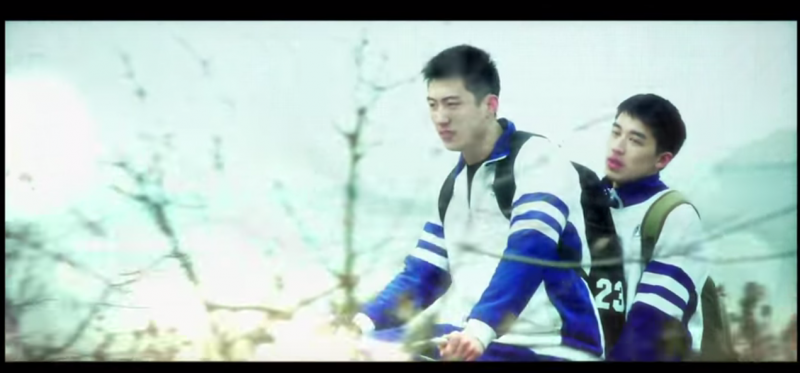 [1]
[1]人気のオンラインドラマ「Addicted(中毒)」は、2週間前に配信が停止された。中国共産党のガイドラインは、テレビドラマの中で同性愛は見せるべきでないと規定している。YouTubeからのスクリーンショット。
人気のドラマ「Addicted(中毒)」 [2]と「Girl Love(ガール・ラブ)」 [2]が突然、複数の動画ストリーミングサイトで配信停止 [3]された。それに続いて先週(訳注:2016年3月第1週)、テレビ放送にふさわしくない事項を列挙したガイドラインが中国のソーシャルメディアに出回った。
この文書は「テレビコンテンツ制作ガイドライン」と呼ばれ、中国共産党と強いつながりを持つ2団体の中国テレビドラマ制作産業協会と中国ラジオ映画テレビ同盟から、業界向けに昨年12月、配布されたものだ。このガイドラインの背後には、「『文学と芸術についての国家フォーラム』で習近平国家主席が行った演説の趣旨を実現する」という狙いがある。これは、2014年後半に開催されたこのフォーラムにおいて、習主席が芸術家に対し、人民に奉仕し [4]共産的思考に同化するよう求めた発言のことを指している。
しかし、もしプロデューサーたちがこのガイドラインを忠実に実行しようとしたら、中国のテレビはひどく退屈なものになるだろう。この文書では、「異常な」性的行動、犯罪シーン、警察の捜査、暴力、常軌を逸した行動、歴史的事実や古典文学とは異なるストーリーなどが禁止されているのだ。
今日に至るまで、中国の娯楽産業は、国家新聞出版広電総局(SARFT)(訳注:中国の全メディアを監督する政府機関)により2010年3月に成立し一般公開された「テレビドラマのコンテンツ管理規定」 [5]に従ってきた。この規定は、コンテンツについて11の原則を掲げてはいるものの、テレビで放送すべきでない内容を具体的に挙げてはおらず、創造性の余地を残していた。
しかし中国では、党と国家の境界線は曖昧だ。先日会議の場で、SARFTの李京盛テレビ局長は、共産党とつながりが密なこれら2団体が発行した最新のガイドラインにテレビ業界は従うべきだと強い調子で訴えた。また、SARFTはオンライン配信のドラマに対しても、テレビ放送のドラマと同様の基準を遵守させると強調した。李局長のこれらの言葉からは、人気のオンラインドラマ2本が配信停止となった事情が伝わってくる。
この新しいガイドラインは、ゲイやレズビアンといった人間関係の描写禁止に留まらず、魅力的なテレビ番組となりそうなコンテンツを軒並み禁止している。そこにあるのはただ、プロパガンダ発揚の余地だけのようだ。
中国のネチズンの間でまず起こったリアクションは、このガイダンスに準拠したらテレビで一体何が放送できるのか、というものだった。以下は、テレビで放送禁止となるべきコンテンツについて書かれた部分を翻訳したものだ(原文中国語版のスクリーンショット [6]はネット上で共有された)。
1. Content that contradicts the Chinese path and social system, that is harmful to the country's image, unity and social stability, that:
- depicts negative images of the country, the state system and policy;
- depicts harmful images of specific professions, groups and social organizations, including the People's Liberation Army, armed police, national security police, security officers, law enforcers;
- exaggerates social problems and over-represents the dark side of society;
- devalues the role of people in history;
- features negative characters or depicts in a positive light anti-revolutionary elements, backwardness, evil, illegal social forces and organizations, and criminals;
- glorifies the military invasion of imperial dynasties in Chinese history;
- advocates colonialism through plot lines, names or images within the series;
- contradicts China's developmental path, or depicts unrealistic and luxurious lifestyles.
2. Content that is harmful to national unity:
- features drama plot lines, names, characters, images, sound effects that are harmful to national feeling;
- shows overt representations that debase or insult cultural practices and beliefs of particular national groups;
- shows stories and historical events that caused harm to national feeling;
- represents military conflicts between different national groups as war between different countries.
3. Content that goes against state religious policy:
- advocates religious extremism and cults;
- makes inappropriate comparisons of different religious beliefs that could create conflict between different religions and schools of thought;
- excessively shows religious dogmas, rules or rituals;
- makes jokes of religious practices.
4. Content that advocates feudal beliefs that go against the scientific spirit:
- promotes feudal beliefs such as spirit possession, reincarnation or witchcraft;
- features feudal culture that promotes ignorance, evil deeds or obscure behaviors.
5. Content that exhibits excessive terror, violence or evil behavior that could induce criminal acts:
- shows violence or homicide, or focuses on the pervasiveness of dark and evil forces;
- depicts in detail criminal cruelty or violent acts, as well as physical and psychological torture;
- exposes processes and details of investigation that could help criminals to circumvent police investigation;
- features obscure criminal cases;
- confuses the value judgement between right and wrong, good and evil, beauty, and blurs the line between just and unjust;
- exhibits deviant acts such as drug abuse, alcoholism or gambling;
- exhibits excessive terror, agony or hysteria that stimulates the sense; shows images, plot lines, music or sound effects that could generate psychological or physical sickness;
- promotes violent revenge or extreme revenge psychology and behavior.
6. Content that exhibits obscenity, vulgarity or banality:
- exhibits evil acts including prostitution, incest and rape;
- exhibits abnormal sexual relations and sexual acts, such as incest, homosexuality, sexual perversion, sexual assault, sexual abuse and sexual violence;
- exhibits and encourages unhealthy marital relations and status, such as extramarital relations, one-night stands or sexual autonomy;
- features images that stimulate the senses or indirect representations or suggestions of sexual behavior;
- features images, plot lines, music or sound effects that are sexually suggestive, harassing or insulting;
- exhibits male or female private parts, or overtly sexy clothing;
- includes vulgar language;
- includes sexually suggestive images, plot lines, music or sound effects that are not suitable for underage viewers.
7. Content that insults or defames others:
- damages important historical characters or the image and reputation of a real person, or causes a negative social impact;
- debase a specific occupation, social status or physical figure.
8. Content that distorts and debases national cultural traditions:
- exaggerates the backward or ignorant aspects of the national;
- attempts to “override” the existing understanding of historical characters or incidents or attempts to “rectify” controversial historical figures or incidents;
- rewrites classic literature or distorts the morality of the original stories;
- contradicts history books or historical fact, deliberately distorts history;
- offers a sensationalized presentation of history, in particular revolution history.
9. Content that is harmful to social morale and has a negative impact on underage viewers:
- exhibits young people's misbehavior such as love affairs, smoking, drinking or street fights;
- includes smoking scenes that violate SARFT regulations;
- features obscure styling of characters that has a negative impact on underage viewers;
- exhibits other uncivilized behaviors that go against social morale.
10. Content that is forbidden by laws and regulations:
- exhibits or reveals the details of specific governmental projects or departmental systems;
- results in international disputes or negative international impact;
- features an abusive or inappropriate use of logos, titles, or jargon of specific authorities;
- shows advertisements in the form of products or the display of service information in violation of SARFT regulations;
- displays environmental destruction or animal abuse;
- violates laws or the spirit of laws and obstructs the development of the country.
1. 中国のたどる道すじと社会システムを否定し、国家のイメージや一体感、社会的安定を損なうコンテンツ
- 国家や国の制度、国策について、否定的なイメージを描くこと
- 特定の職業、団体、社会組織の威信を損なうようなイメージを描くこと。これには、中国人民解放軍、武装警察、国家安全警察、安全官、法執行機関が含まれる
- 社会問題や社会の暗黒面を誇張すること
- 歴史上の人物の役割を過小評価すること
- ネガティブな姿勢のキャラクターを登場させること。もしくは、反文化大革命的要素、後進性、悪事、違法な社会勢力または団体、犯罪者について、肯定的に描くこと
- 中国史における中国王朝への軍事侵攻を賛美すること
- シリーズ番組の中で、セリフや名称、イメージを通じて、植民地主義を擁護すること
- 中国発展の道のりを否定すること。もしくは、非現実的かつ贅沢なライフスタイルを描くこと
2. 国家の一体感を損なうコンテンツ
- 国民感情を傷つけるような、セリフや名称、キャラクターやイメージ、効果音を使用すること
- 特定の民族グループの文化的慣習や信仰について、あからさまに貶(おとし)めたり侮辱したりするような描き方をすること
- 国民感情を損なうストーリーや歴史的出来事を見せること
- 異なる民族グループ間における軍事衝突を、国家間の戦争として描くこと
3. 宗教についての国策に反するコンテンツ
- 過激派の宗教団体やカルトを擁護すること
- 異なる宗教や学派の間に論争を呼びかねない、不適切な比較を異なる信仰の間で行うこと
- 宗教教義やしきたり、儀式を過剰に見せること
- 宗教的慣習を揶揄(やゆ)すること
4. 科学の精神に逆行する封建的迷信を擁護するコンテンツ
- 憑依(ひょうい)や輪廻転生(りんねてんしょう)、魔術といった封建的迷信を助長すること
- 無知や悪事、理解不能な行動を促進するような封建的迷信文化を取り上げること
5. 犯罪行為を助長しかねない、過度の恐怖や暴力、悪事を見せるコンテンツ
- 暴力や殺人を見せること。もしくは卑劣な人間がいかに多いかに焦点を当てること
- 身体的または精神的な拷問、あるいは残酷な犯罪や暴力行為を、詳細に描くこと
- 犯罪者による警察の捜索回避を可能とするような捜査の手順や詳細を公開すること
- 奇怪な犯罪事例を取り上げること
- 正誤、善悪、優劣などの価値判断を混乱させること。また公正と不当の境目を曖昧にすること
- 薬物乱用やアルコール依存、賭博といった反社会的行動を見せること
- 感情をかき乱すような過度の恐怖や苦悶(くもん)、興奮状態を見せること
- 精神的もしくは身体的な疾患を引き起こすようなイメージやセリフ、音楽や効果音を使うこと
- 暴力的な復讐や、極端な報復感情や報復行動を助長すること
6. わいせつ、低俗、もしくは陳腐なコンテンツ
- 売春、近親相姦、強姦などの悪行を見せること
- 近親相姦、同性愛、性倒錯、性的暴行、性的虐待、性的暴力といった、異常な性的関係や性的行為を見せること
- 不倫、ワンナイトラブ、フリーセックスなどの不健全な婚姻関係や婚姻状態を見せたり助長したりすること
- 官能を刺激するイメージを見せること。もしくは、性的行為をほのめかした表現を使うこと
- 性的に挑発したり、不快感を与えたり、侮辱したりするようなイメージやセリフ、音楽や効果音を使用すること
- 男性または女性の陰部、もしくはあからさまに性的な服装を見せること
- 卑猥(ひわい)な言葉を使うこと
- 未成年の視聴者にふさわしくない、性的に挑発するイメージやセリフ、音楽や効果音を使うこと
7. 他者を侮辱もしくは中傷するコンテンツ
- 歴史上の重要人物を中傷すること、または実在する人物のイメージや評判を傷つけること。もしくは社会にマイナスの影響を与えること
- 特定の職業、社会的地位、または体格について貶めること
8. 国家の文化的伝統を歪曲したり貶めたりするコンテンツ
- 国民の後進的または無知な部分を誇張すること
- 歴史的人物または歴史的出来事についての既成概念を「書き換え」ようと試みること。もしくは、物議を醸している歴史的人物または歴史的出来事について「修正」しようと試みること
- 古典文学を書き換えたり、原作の持つ倫理観を歪曲すること
- 歴史書や歴史的事実を否定すること。もしくは意図的に歴史を歪曲すること
- 歴史、なかでも特に文化大革命の歴史について、扇情的な描き方をすること
9. 社会の士気を下げ、かつ未成年の視聴者にマイナスな影響を与えるコンテンツ
- 恋愛、喫煙、飲酒、通りでの喧嘩(けんか)といった、若者の非行を見せること
- SARFTの規定に違反するような喫煙シーンを入れること
- 未成年の視聴者にマイナスの影響を与えるような奇妙なキャラクターを登場させること
- その他、社会の士気を下げるような野蛮な行動を取り上げること
10. 法令で禁止されているコンテンツ
- 特定の国家計画または各部門のシステムについて、詳細を公表すること
- 国際社会で論争を招いたり、対外的にマイナスの影響を与えたりすること
- 特定の機関のロゴや肩書き、隠語が、乱用されていたり不適切に使用されているところを見せること
- SARFTの規定に違反して、製品やサービス情報を見せるコマーシャルを流すこと
- 環境破壊や動物虐待を見せること
- 法律や法の精神に違反し、国家の発展の妨げとなること
ある程度予想できたことだが、このガイドラインに対し、中国ネチズンの間からは不満の声が噴出した。ネチズンたちによると、これは創造性を禁止し、娯楽産業を衰退に追いやるものだという。この怒りを静めるため、党機関紙は、これらガイドラインの目的は業界による「自己規制」だと説明した [7]。
しかしながら、オンラインの人気ドラマ2本が配信停止されたことからもわかるように、当局はこの共産党のガイドラインに勢いを得て、共産党のイデオロギーに異を唱えていると判断したコンテンツについて任意的かつ選択的に検閲、禁止している。